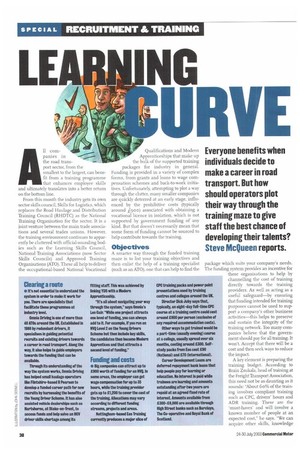Clearing a route
Page 38

If you've noticed an error in this article please click here to report it so we can fix it.
• It's not essential to understand the system in order to make it work for you. There are specialists that facilitate these programmes at industry level.
Omnia Driving is one of more than 40 ATOs around the UK. Established in 1998 by redundant drivers, it specialises in guiding potential recruits and existing drivers towards a career in road transport. Along the way, it also helps to guide employers towards the funding that can be available.
Through its understanding of the way the system works. Omnia Driving has helped small haulage operators like Flintshire-based R Pearson to develop a funded career path for new recruits by harnessing the benefits of the Young Driver Scheme. It has also assisted vehicle dealerships such as Hartshorne, at Stoke-on-Trent, to access funds and help solve an HGV driver skills shortage among its
fitting staff. This was achieved by linking YDS with a Modern Apprenticeship.
"It's all about navigating your way through the system," says Omnia's Len Hair. 'While one project attracts one level of funding, you can always add to it. For example, if you run an NVQ Level 2 on the Young Drivers Scheme but then include key skills, the candidates then become Modern Apprentices and that attracts a second level of funding."
Funding and costs
• Big companies can attract up to 1900 worth of funding for an NVQ. In some areas, the employer can get wage compensation for up to 35 hours, while the training provider gets up to 11,200 to cover the cost of the training. Allocations may vary according to different funding streams, projects and areas.
Nottingham-based Los Training currently produces a major slice of CPC training packs and power point presentations used by training centres and colleges around the UK.
Director Dick Juby says that, typically, an eight-day full-time CPC course at a training centre could cost around £800 per person (exclusive of any required accommodation costs).
Other ways to get trained would be a part-time (usually evening) course at a college, usually spread over six months, costing around £300. Selfstudy packs from Eos cost £90 (National) and £70 (International).
Career Development Loans are deferred repayment bank loans that help people pay for learning or education. No Interest is paid while trainees are learning and amounts outstanding after two years are repaid at an agreed fixed rate of interest. Amounts available from £300-18.000 are available through High Street banks such as Barclays, The Co-operative and Royal Bank of Scotland.




























































































































































